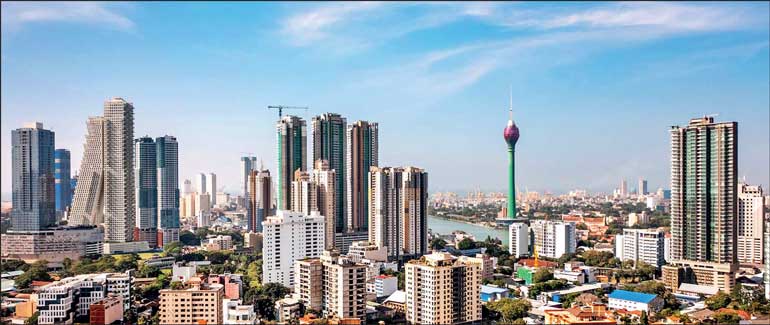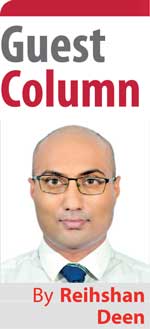Saturday Feb 14, 2026
Saturday Feb 14, 2026
Wednesday, 11 June 2025 00:20 - - {{hitsCtrl.values.hits}}

The answer lies not in how resource-rich a country is, nor its cultural background or climactic features, but how effectively and efficiently they use the resources that they do have
 Why are some countries rich and others poor? An age-old question in economics, with numerous hypotheses suggested as answers. It is clear that being richly endowed with natural resources is not a reliable indicator; D.R. Congo lies atop substantial mineral wealth, yet its people are among the poorest in the world. Conversely, Japan is noted for lacking natural resources and ranks among the highest income per capita countries in the world. Culture is another non-starter; North and South Korea share the same language and heritage, yet at present one country is economically impoverished and the other is an economic superpower.
Why are some countries rich and others poor? An age-old question in economics, with numerous hypotheses suggested as answers. It is clear that being richly endowed with natural resources is not a reliable indicator; D.R. Congo lies atop substantial mineral wealth, yet its people are among the poorest in the world. Conversely, Japan is noted for lacking natural resources and ranks among the highest income per capita countries in the world. Culture is another non-starter; North and South Korea share the same language and heritage, yet at present one country is economically impoverished and the other is an economic superpower.
This is more surprising given that, while the territories of both countries were ravaged by the Korean war, post-war North Korea was considered to be better off economically vis-à-vis South Korea since the vast majority of initial heavy industry and natural resources were located in the North. Historically, East and West Germany held similar circumstances and outcomes. The common climate between such countries rules that out as being a determinant. Perhaps, then, the answer lies not in how resource-rich a country is, nor its cultural background or climactic features, but how effectively and efficiently they use the resources that they do have.
According to the 2024 Nobel Laureates in Economic Sciences, Daron Acemoglu, Simon Johnson, James A. Robinson, such use is determined by political and economic institutions.
Rules of the game
Institutions are the rules of the game in economic, social, and political interactions that citizens of a society abide by. They are the written laws and unwritten norms that govern what can or cannot be done, the constraints that bind adherents from performing certain actions and that incentivise them to perform others. Institutions can be separated by type on what they influence: economic institutions are those that shape economic incentives and the distribution of economic resources, such as property rights and the type of economic system; whereas political institutions are those that shape political incentives and the distribution of political power, such as the form of government, constitutional law, independence of judiciary, and level of political accountability (politics itself can be said to be the process by which a society chooses the rules that will govern it).
 A distinction exists between institutions that are explicit and written down, such as codified rules and laws, and those that are implicitly recognised and followed, such as customs, norms, and common practices. The former, explicit institutions are known as formal institutions, and the latter, implicit institutions are known as informal institutions. Importantly, the informal institutions are what determine how the formal institutions are used. Countries may indeed share formal institutions (Sri Lanka, like France, has an executive presidency) yet their informal institutions, such as actual political practices, respect for democratic norms and adherence to the rule of law, differ substantially.
A distinction exists between institutions that are explicit and written down, such as codified rules and laws, and those that are implicitly recognised and followed, such as customs, norms, and common practices. The former, explicit institutions are known as formal institutions, and the latter, implicit institutions are known as informal institutions. Importantly, the informal institutions are what determine how the formal institutions are used. Countries may indeed share formal institutions (Sri Lanka, like France, has an executive presidency) yet their informal institutions, such as actual political practices, respect for democratic norms and adherence to the rule of law, differ substantially.
Inclusive or extractive institutions
Acemoglu and his co-laureates make the case in their published works that a country’s prosperity is determined by how inclusive or extractive their economic and political institutions are. Extractive economic institutions are those that are designed to extract incomes and resources from one subset of the population to benefit another subset; in effect, one group reaps the rewards from exploiting the other group – the other group is excluded from such gains and from participating in economic activities as they wish. Examples include the colonial economic system of plantations and mines common across much of Asia, Africa and South America, built and maintained for the benefit of colonial rulers, but also post-colonial and modern institutions where labour and other resources are coerced, extorted or expropriated from one group to service another.
Both communist command-and-control economies and crony-capitalist oligarchic economies are extractive in nature. Inclusive economic institutions, in contrast, are those that allow and encourage the participation by a population in economic activities without limitation, and to make best use of their skills and talents while preserving their individual choice. Inclusive economic institutions prevail in developed countries. While extractive economic institutions can create some economic advances, and there are periods where it seems extractive economies outstrip inclusive economies, such gains are ephemeral. Inclusive economic institutions provide a more solid foundation to economic development, and a more reliable engine for growth, and ultimately exceed extractive economies in shared prosperity.
Acemoglu and his colleagues argue that this is a common historic occurrence; all countries originally had extractive economic institutions, with some being more prosperous than others, but the countries that adopted inclusive economic institutions were able to far exceed those that did, even if they were originally the underdogs – such a historical development is called a reversal of fortune.
Extractive political institutions are those where political power is overly concentrated in the hands of one subsection of the population at the expense of another (i.e. such institutions are insufficiently pluralistic), such as in dictatorships like North Korea or in apartheid South Africa, or where political power is under-concentrated or so diffuse as to be akin to anarchy, such as in Haiti. Such examples of extractive polities are extreme, however; more common are illiberal democracies or polities where democratic norms, checks and balances, rights and freedoms are weakly protected or enforced. Inclusive political institutions are those that are sufficiently centralised and pluralistic, where rights of all are protected and not infringed upon – authority exists without being exclusive, abusive or authoritarian.
There is strong interplay between economic and political institutions. Extractive economic institutions can lead to extractive political institutions, and vice versa. The group that prospers in an extractive economy is often able to parlay that economic strength into political strength and concentrate political power to themselves, for example through political funding, lobbying, or even outright bribery and corruption. The political elite in power in extractive polities are able to create extractive economic institutions from which they benefit, making them an economic elite as well. A prime activity through which this is done is known as rent-seeking, where financial benefits or special advantages are secured by an individual, organisation, or firm through economic and legal manipulation rather than through honest trade and production of new wealth. For example, lucrative government contracts or projects may be improperly awarded to companies owned or operated by a government politician, their relatives, or their allies, thus enriching those individuals at the expense of the public.
Meanwhile, inclusive political institutions are incentivised to end or prevent the establishment of extractive economic institutions in favour of inclusive ones, and inclusive economic institutions distribute economic power more evenly, thus making it harder to concentrate economic and political power.
Although economic institutions of a certain type tend to sustain each other, it is not always the case that countries’ political and economic institution share the same nature. South Korea developed their economy while under dictatorship; while their political institutions were extractive, their economy developed by becoming more inclusive. This inclusive economy and its consequences helped to end dictatorship and foster democratic rule in the late 1980s.
Influence of past decisions and events
Acemoglu et al. also contend that there is a strong path dependence regarding institutions, meaning that past decisions and events influence current outcomes and actions (one’s present choices are dependent on the path one took). Societies that had institutions of a certain type in the past were likely to have that same type in the present; in other words, institutions were and are persistent. For example, colonies where Europeans settled and formed the greater part of the population were more likely to create (relatively) inclusive political institutions with enshrined rights modelled on those found in their home countries (e.g. Australia, Canada, the US, based on the UK). Colonies where Europeans did not settle or that had large native populations whom Europeans had to subjugate – as in much of Asia, Africa, and Latin America – were more likely to create extractive institutions, where resources were extracted from the natives for European gain, and power was concentrated in European hands.
Governments were modelled and infrastructure built mostly not for the benefit of the local native population but to ease political control and the extraction of resources. These extractive economic and political institutions were more likely to persist after independence; the European elite were replaced by a native elite that appropriated the extractive machinery of state and economy for their purposes, reaping the benefits that previously accrued to the Europeans.
The colonial legacy in Sri Lanka is mixed. The British left Sri Lanka, among other things, a legal system, infrastructure, and a more-or-less inclusive form of government (marked by a universal franchise granted in 1931), but also the seeds to ethnic conflict (seeds that admittedly need not have been planted, nurtured and harvested by post-independence leaders) and elitist structures in its political and economic institutions. Since independence, Sri Lanka has wobbled between making institutions more inclusive and more extractive, to the detriment of its people.
Making Sri Lankan political institutions more inclusive would mean making it more pluralistic and representative, strengthening checks and balances, and improving upon the informal institutions by strengthening norms of accountability and respect for rule of law. Making Sri Lankan economic institutions more inclusive would be actively guarding against rent-seeking, promoting transparency, sustaining an unbiased legal system, and fostering and creating economic opportunities through openness. Doing so would set Sri Lanka on a self-sustaining development path.
(The writer is an economics graduate with an MSc Economics from KU Leuven, a Master in Conflict and Peace Studies from the University of Colombo, and MA (Hons) Economics from the University of Edinburgh, and can be reached at [email protected].)